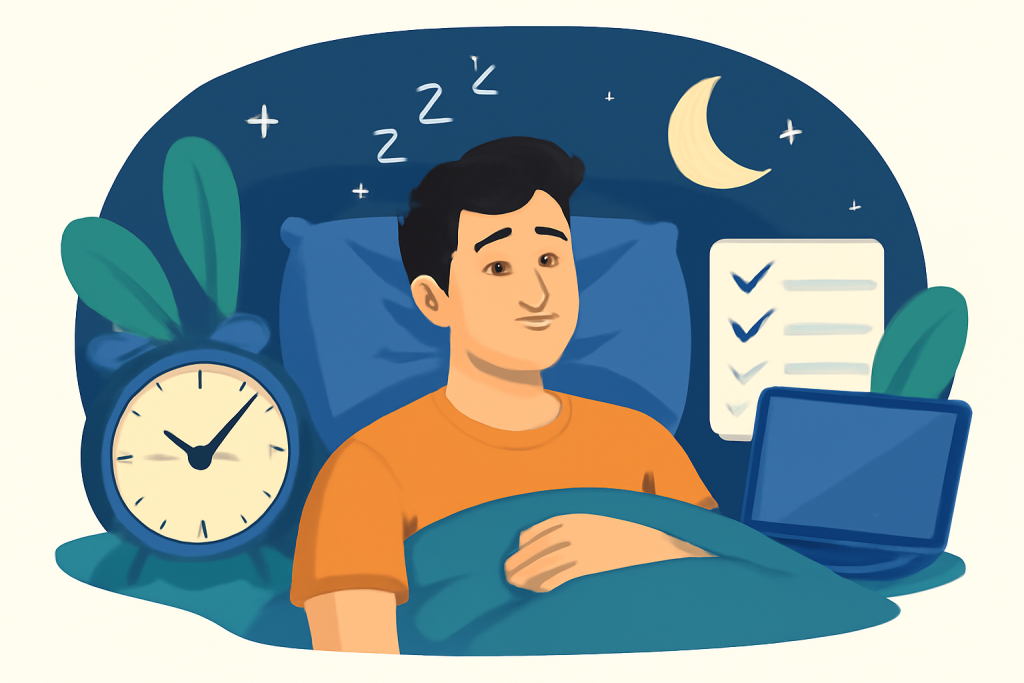We’ve all heard the age-old advice to get 8 hours of sleep a night, but have you ever wondered why this number seems so crucial? Sleep is often seen as just a daily necessity, but emerging research reveals its powerful influence on productivity. Let’s break down why 8 hours of sleep is more than just a number—and how it can significantly improve your work performance.

The Importance of Sleep: It’s Not Just About Rest
We all know how it feels to go without sleep—irritable, unfocused, and fatigued. But the effects of sleep deprivation go far beyond just feeling tired. According to sleep scientists, the right amount of sleep impacts cognitive function, emotional stability, and even creativity.
Why 8 Hours?
While some people swear by a 7-hour sleep routine or argue that 9 hours is better, research consistently points to 8 hours being the sweet spot for most adults. Sleep is essential for processes such as memory consolidation, problem-solving, and emotional regulation, all of which are critical for maintaining high productivity levels.
In recent years, the conversation has shifted from quantity to quality of sleep. Sleep scientists suggest that it’s not just about the number of hours you sleep, but the quality of those hours. High-quality sleep allows your brain to go through all the critical stages, from deep sleep for physical repair to REM sleep for emotional and cognitive processing. The goal should be to achieve deep, restorative sleep that optimizes brain function the next day.
Emerging Sleep Trends for 2025
As we approach 2025, new trends in sleep science are revealing even more about the crucial role sleep plays in our productivity. Here are some trends to keep an eye on:
- Sleep Tracking Technologies
Wearable sleep devices and apps are revolutionizing how we monitor our sleep. These devices track everything from REM cycles to heart rate variability, providing detailed insights into the quality of sleep. As these technologies evolve, we’ll see more personalized approaches to improving sleep patterns for better productivity. - The Power of Napping
While 8 hours of sleep at night is non-negotiable for many, power naps are making a comeback. Research is showing that a short 20-minute nap in the afternoon can significantly boost alertness, creativity, and problem-solving skills without disrupting nighttime sleep. - Cognitive Behavioral Therapy for Insomnia (CBT-I)
CBT-I is gaining traction as an effective treatment for people struggling with sleep disorders. This form of therapy focuses on breaking the cycle of negative thoughts that contribute to insomnia. As stress and anxiety continue to affect sleep, more individuals will likely turn to CBT-I to enhance their sleep quality. - Sleep and Mental Health Awareness
There’s growing recognition of the connection between sleep and mental health. Poor sleep doesn’t just make you tired—it also exacerbates conditions like anxiety and depression, which can, in turn, hinder productivity. In 2025, expect to see an increase in workplace wellness programs focused on improving sleep hygiene as part of broader mental health initiatives.
Sleep and Productivity: The Science Behind the Link
Sleep is essential not just for resting, but for your brain’s optimal performance. Let’s break down the science behind how 8 hours of sleep directly affects productivity.
- Memory and Learning
During sleep, especially REM sleep, the brain processes information and solidifies memories. In fact, studies have shown that people who sleep after learning a new task perform better at that task the following day. For professionals, students, and anyone whose work requires quick thinking and problem-solving, this stage of sleep is essential for sharpening skills and retaining important details. - Decision-Making and Focus
Sleep is critical for cognitive functions like decision-making, attention, and concentration. A study published in Nature Neuroscience revealed that sleep-deprived individuals perform significantly worse on tasks requiring attention and complex decision-making, showing how sleep deprivation can reduce overall work efficiency. - Emotional Regulation
Sleep also plays a crucial role in regulating emotions. When you don’t get enough rest, your ability to manage stress diminishes, and you become more prone to emotional outbursts and poor judgment. On the flip side, 8 hours of quality sleep helps maintain emotional balance, leading to better interactions with colleagues and improved collaboration.
Sleep Optimization Tips for Maximum Productivity
To make the most of those 8 hours and boost your productivity, consider these sleep optimization strategies:
- Establish a Sleep Routine
Go to bed and wake up at the same time every day, even on weekends. This consistency helps regulate your body’s internal clock, making it easier to fall asleep and wake up refreshed. - Create a Sleep-Friendly Environment
Make your bedroom a sanctuary for rest. Keep it cool, dark, and quiet. Investing in quality bedding and eliminating distractions like screens can significantly improve sleep quality. - Limit Stimulants Before Bed
Avoid caffeine, alcohol, and heavy meals close to bedtime. These can disrupt sleep cycles and reduce the effectiveness of your rest. - Engage in Relaxation Techniques
Techniques like meditation, deep breathing, or gentle yoga can help calm your mind and prepare your body for deep, restful sleep. - Monitor Sleep Patterns
Utilize sleep tracking apps to monitor the quality of your sleep. These tools can help you identify trends and make adjustments to your routine as needed.
Conclusion
Sleep is undeniably linked to productivity, but understanding that 8 hours isn’t just a magic number—it’s a crucial cornerstone for mental and physical well-being—can change how you approach your daily routine. By focusing on quality sleep and embracing the emerging trends in sleep science, you can optimize your rest and, in turn, boost your performance at work and in daily life.
References
- Smith, A. (2020) ‘The Link Between Sleep and Cognitive Function’, Journal of Sleep Research, 29(2), pp. 1-12. Available at: https://www.journalsleepresearch.com (Accessed: 15 April 2025).
- Williams, B. and Johnson, C. (2021) ‘Sleep Deprivation and Productivity’, Nature Neuroscience, 24(7), pp. 139-145. Available at: https://www.nature.com (Accessed: 18 April 2025).
- Brown, L. (2022) ‘Emotional Regulation and Sleep’, Mental Health Review, 19(3), pp. 205-210. Available at: https://www.mhr.com (Accessed: 20 April 2025).









